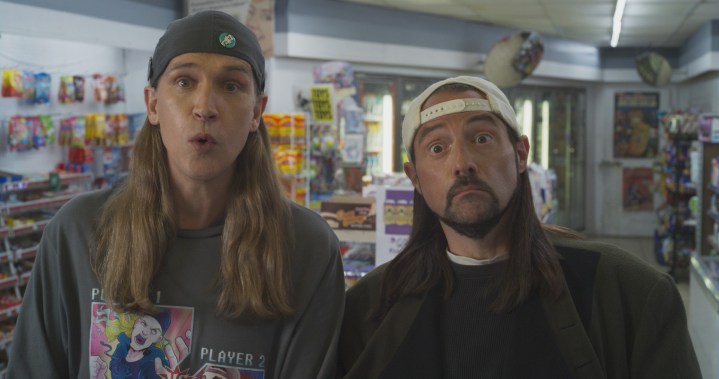It is no secret that the film industry of today is dominated by franchises. Familiar characters and storylines are considered more of a surefire bet to draw people to theaters in an increasingly cutthroat market. Perhaps nobody understands that better than Kevin Smith, whose film Clerks III hits theaters this month.
Despite being a relic of another era, Smith has drawn from his well of previous success repeatedly over the course of his long career, trying to establish the same familiarity with his quirky indie characters that one might have with the MCU. If the movie industry is now dominated by shared universes, it’s partly thanks to Smith, whose View Askewniverse not only helped pave the way for the MCU and DCEU by popularizing geek cred, but also created and maintained the legacy of Kevin Smith: friendly, engaging, and relentlessly obsessed with pop culture.
An origin story fit for a superhero
The writer-director famously broke into the industry in 1994 with the original Clerks, a black-and-white hangout comedy based on his frustration with his dead-end job. Shot for a measly $27,000 at the very same store he worked at, the film starred Smith’s close friends, Brian O’Halloran and Jeff Anderson, as the lead roles. Smith was part of a new wave of independent auteurs who inspired dudes across the nation that they too could be discovered by the then-revered Harvey Weinstein, draw big(ish) box office numbers, and have their work screened at Cannes.
Fast forward to today and that formula, to say nothing of Weinstein himself, is pretty much extinct. With the exception of a few outliers like Quentin Tarantino or Paul Thomas Anderson, whose talents have defied industry logic, the draw of a big-name director is not nearly what it once was.

As his peers moved on to more ambitious projects to satiate their bulging egos, Smith always appeared more comfortable staying put in the mundanity of the world he had already established. Clerks worked so well because of its smallness, both in scope and ambition. Dante (O’Halloran) and Randall (Anderson) were average guys in an average New Jersey town, working at an average convenience store, having average encounters with average customers.
The characters had lengthy discussions about totally un-average films like Star Wars, because that’s what most people would do. So when Smith’s budgets got bigger after Clerks, and the stars became more recognizable, and his plots became more ambitious, it always felt at odds with his best qualities.

He must have known it, too, because he would keep putting the same things in all of his films, even as he became more respected in the industry. Whether the story became about slackers in a mall (Mallrats), falling in love with lesbians (Chasing Amy) or even an existential conflict based on the Bible (Dogma), the general feel was always the same. There were lengthy diatribes on pop culture, male hang-ups over women’s sex lives, and most importantly, characters that would carry over from film to film.
In the spirit of the mega-franchises that Smith clearly idolized, he created the View Askewniverse, his own cinematic universe. There would always be a reference to somebody from high school. Everybody knew Rick Derris. Everybody would go to the same Quick Stop to get snacks. And everybody would run into drug dealing duo Jay (Jason Mewes) and Silent Bob (Smith), whether they were a comic book artist from New York or the actual angel of death.
It felt as though Smith just could not let go of his initial success. His adoration for the authentic world that he recreated with Clerks may have been something real for him to hold onto as he entered the artificiality of Hollywood. The foulmouthed Jay and the wise Silent Bob became his own version of Batman and Robin, or Mermaid Man and Barnacle Boy. Inane catchphrases like “Snoochie boochies” started appearing everywhere across his films.
And then in 2001, after Jay and Silent Bob Strike Back, which took the incessant references to past films to a whole new level, resulting in something that a non-Smith-head might struggle to understand, it seemed as though he was finally ready to shed the past, stop the references, and up the ambition even further. 2004’s Jersey Girl, a big-budget romance starring Ben Affleck and Jennifer Lopez, was the first to not feature any previous characters or references, and it was a critical and commercial failure. And then in 2006, he made Clerks II.
Back to the beginning
12 years after they first were seen working at Quick Stop, Dante and Randall were now plying their trade at the fictional fast food joint Mooby’s– a little heavier, a little sadder, but with the same low level of emotional intelligence. Gone was the low-budget charm of the original, more exposed were the subpar acting chops of the two leads. The humor was raunchier and felt ickier in a more politically correct landscape. The cultural commentary was staler. The fact that Dante had to choose between his tall, rich fiancée Emma (Jennifer Schwalbach Smith) and the stunning Becky (Rosario Dawson) felt very much like a ludicrous fantasy.

And yet, despite all of its pale imitations of the original, there was still an affecting undercurrent of aimless men in arrested development. Smith may have moved from a McJob to the Hollywood circuit, but he was still able to channel that past dissatisfaction, maybe even from frustration at his own creative stasis.
That stasis has not really gone away. Smith declined in popularity and critical acclaim with each successive film, even as he ventured out of his comfort zone. The industry largely left him behind, and he turned his attention to podcasting. Then in 2018, Smith suffered a massive heart attack. Along with major lifestyle changes, Smith returned to the View Askewniverse, first with Jay and Silent Bob Reboot in 2019, and now with Clerks III. Smith realized, when faced with his own mortality, that he needed more time and closure with his most beloved creations. The resulting third entry is deeply sentimental, harking back to an earlier, simpler time, and is less of a film about Dante and Randall than it is about Clerks, and by extension, Smith himself.
A trilogy with a melancholy ending
Now owners of the Quick Stop, fifty-somethings Dante and Randall are back like they never left, with their familiar dynamics and shenanigans, until Randall suffers a heart attack. Faced with his own mortality, Randall decides to stop being a passenger in his own life and make a movie about his life at the Quick Stop.

The meta-ness does not stop there. Peppered amongst the boomer-tastic pop culture references (NFTs? Tinder dates?) is a reintroduction of almost every character from the Clerks franchise. It then becomes clear that the film within the film is the original Clerks, beat-for-beat. Not only that, but the production debacles that Dante and Randall face when making their film are the exact challenges that Smith faced as an indie debutante.
In this oversaturated market of constant sequels and reboots, one question has plagued some film enthusiasts: how much fan service do we really need? Smith laughs in this question’s face, making a film entirely out of fan service, callbacks, and behind-the-scenes Easter eggs. For those that are in the theaters to see Clerks III or have followed Kevin Smith’s career, anything else would be a disappointment.
You’re there to hear Dante groan, “I’m not even supposed to be here today!” You’re there to scream “Snoochie Boochies!” when Jay comes on screen, as if you are yelling “Luke, I am your father,” or “Mr. Stark, I don’t feel so good.” You are there to reward yourself for sticking with Smith’s universe for so long, as you are there to let Smith know that there are people that still care about his work, and recall the indie landscape of 1990’s cinema with a deep fondness.

The sadness is much more front-and-center than with the previous Clerks films. We learn that Dante is still grieving the loss of his fiancée (Dawson), who was struck by a drunk driver, killing her and the baby inside of her. Her ghost is constantly telling him to move on with his life, but he doesn’t seem able to. He can’t forget that he once had a promising future, much like Smith, who was once touted as one of the next great American filmmakers.
It is easy to wonder if Smith is reckoning with the trajectory of his own career, his inability to move on from previous successes and previous times in his life. And despite the clunkiness of much of the film, the shameless self-referencing and out-of-touch humor, it does seem like Smith really is allowing himself the glory of basking in the past once more, before a late plot development truly signifies that this really is the end of the Clerks story.
The next generation?
When clips from Randall’s movies are shown, they are literally scenes from the first film. It is a bit of magical realism to look at the Dante and Randall of thirty years ago and to pretend that they are the same age as they are now, but it is a gripping bit of cinematic magic. The two men, so frustrated with their stagnant lives, look at their greatest creation and realize that they have accomplished something worthwhile during their lifetime. And with that, they can move on peacefully.
With Clerks III, Smith has written the final chapter of the greatest story of his life. It may be deeply difficult for him, and his most dedicated fans, to let go, but even Smith may be able to realize that sometimes there is nothing more to be said. Like Captain Kirk before him, he knows it is time for a new generation to fully take over the pop culture helm.



